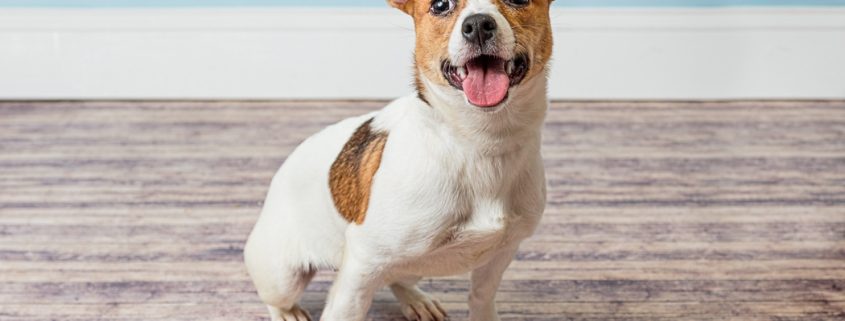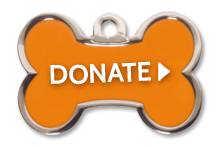Ask Crystal: Mouthy Puppy

Dear Crystal,
We have a nine-week-old corgi puppy. She is biting constantly. We are trying to stay calm and positive but she is drawing blood. We try to distract her with bones or go outside. We have had her for 2.5 weeks and she is only getting worse. Any suggestions? I know it will take time and she left her mama before learning manners. I don’t want to yell and get angry. It’s hard when your hands are all bruised. It is worse with me and she barks at me so I think she is trying to be alpha. We are trying to reward good behavior but it lasts only seconds.
Sincerely,
My Hands Hurt
Dear My Hands Hurt,
Oh boy! I have been there many times and it is not fun. It’s definitely one of the parts of having a puppy that people seem to forget, kind of like forgetting the pain of childbirth. We call this behavior mouthing to distinguish it from biting which refers to aggressive behavior which is meant to threaten. It does take some effort for this behavior to improve.
Dominance is a concept that is widely misused and misunderstood by the public to the great detriment of not only dogs but humans and additionally, their relationship with their dogs. Unfortunately, it has been perpetuated by certain TV personalities that are very charismatic but not knowledgeable about dog behavior. The term dominance refers to priority access to limited resources. It only applies to resources and it doesn’t involve humans. It’s a dog-to-dog term. It also varies day to day and resource to resource. Research shows that wolves are not dominated by an alpha that is the most aggressive male of the pack. They are organized like families and there is little aggression or fights for “dominance”. Additionally, dogs are not wolves and while they do share some behaviors, we cannot explain dog behavior using wolf models. Using dominance as an explanation for behavior is not only incorrect but also completely useless in solving behavior problems. If dominance is a personality trait, there is no fixing it so there is nothing that can be done. It also causes humans to behave aggressively towards their dogs in an effort to dominant them which not only doesn’t solve the problem it creates more because you scare the dog and your behavior looks unpredictable to them. Rather, a more useful and kind way to train is to get the dog to cooperate with you.
Mouthing is a completely normal puppy behavior. Dogs use their mouth to explore their world and communicate. We do have to teach the puppy over time to mouth with less and less pressure and to eventually stop. A dog’s ability to restrict their bite pressure is taught when they are a mouthing puppy. It is important for a dog to have bite inhibition so that if and when they do bite, they do not injure a human or another animal. You are absolutely right that you need to keep it friendly. I know how much it hurts right now but this part where they bite as hard as they can doesn’t usually last that long if you handle things correctly. We start by teaching the puppy that biting too hard makes the thing that they want which is us, go away. When the puppy bites too hard, say “Oops” in a cheerful voice and stand up and turn away. You may need to walk out of the room or use a puppy pen that you are able to get out of and leave the puppy in. Come back to interact with her again and repeat any time she bites too hard. Over time you accept less and less mouth pressure to make you leave until she is about 5 months when we can start teaching her not to mouth at all.
One thing that is very important is being sure the puppy is getting adequate physical and mental stimulation. A tired puppy is much less likely to have the energy to be mouthy.
- Teaching tug with rules is a great way to burn energy and teach her how to calm herself down. Hold the tug up by your chest and wait for a moment of calm and then say, “take it” and tug for a couple of seconds. Make your hand go limp and place a treat up to her nose so she drops the tug. Repeat process but don’t play more than a couple of minutes at first. Gradually, increase how exciting you are before she can take it and later how long she can play with it.
- A flirt pole is a great option for playing with a mouthy puppy because you can get some distance from those sharp puppy teeth. If she isn’t into tug, flirt pole or fetch, trying scattering her kibble all over the backyard so she has to use her nose to run around finding it. Or play a training game where you say “find it”, toss a kibble in the grass and then call her back over to you. Find it is a great distraction game when you can see she is about to become mouthy.
- As far as training, I suggest that you focus on exercises which are meant to calm her down like relaxing on the mat. Relaxing on a mat teaches your dog to relax rather than getting excited or demanding when she wants attention. It isn’t telling your dog to lay on a mat but rather waiting for the dog to make the choice to lay on the mat. The benefits are that the dog learns what to do when she isn’t sure what to do. The dog learns how to relax on her own. It gives the dog a way to resolve anxiety on her own.
- Be sure to use toys when you play with your puppy to redirect their play onto appropriate items. We never want to play with the puppy with our hands. I like to wiggle a stuffed toys around to entice them. For puppies that like to bite pant legs or feet, I often suggest a really long tug toy to drag around while you walk. It is also very important to have hard chew toys and toys to help with teething. I always feed my puppies through frozen Kongs, where I stuff the Kong with wet kibble and some canned food. Freezing it makes it soothing for their painful gums. It also teaches them what is appropriate to chew on and satisfies their innate need to chew and mouth.
In my experience, combined with the techniques above, playing with another dog regularly is one of the most effective ways to help a puppy stop mouthing. The only dog I ever had who had an issue with mouthing too hard, we did not have another dog during her puppyhood. Every other dog we have had has either not done it much at all or stopped quickly. If you don’t have another dog, try to find a friend with a puppy friendly dog. It is important that the dog likes puppies so your puppy will not get hurt. A puppy kindergarten class may also have some puppy play time and they can help you through these puppy challenges and help you learn how to socialize her.
In the beginning, yes you will only get seconds of good behavior. We have to build on a lot of repetition. And give yourself a break. If you need a break from her, put her in her pen or crate in a room and give her some quiet time. Sometimes puppies get themselves very worked up and a nap is in order. We often find that when puppies are acting out, they are overstimulated or tired. Incorporate naps into her day so she gets into that habit. Behavior is not linear. It does get better and better until it goes away. Dogs have good and bad days and their behavior will reflect that. You should start to see a trend of improvement and hopefully in a few months, it will be a behavior of the past. Good luck and happy training!
Until next time,
Crystal
Submit your own pet behavior question for Crystal here:







